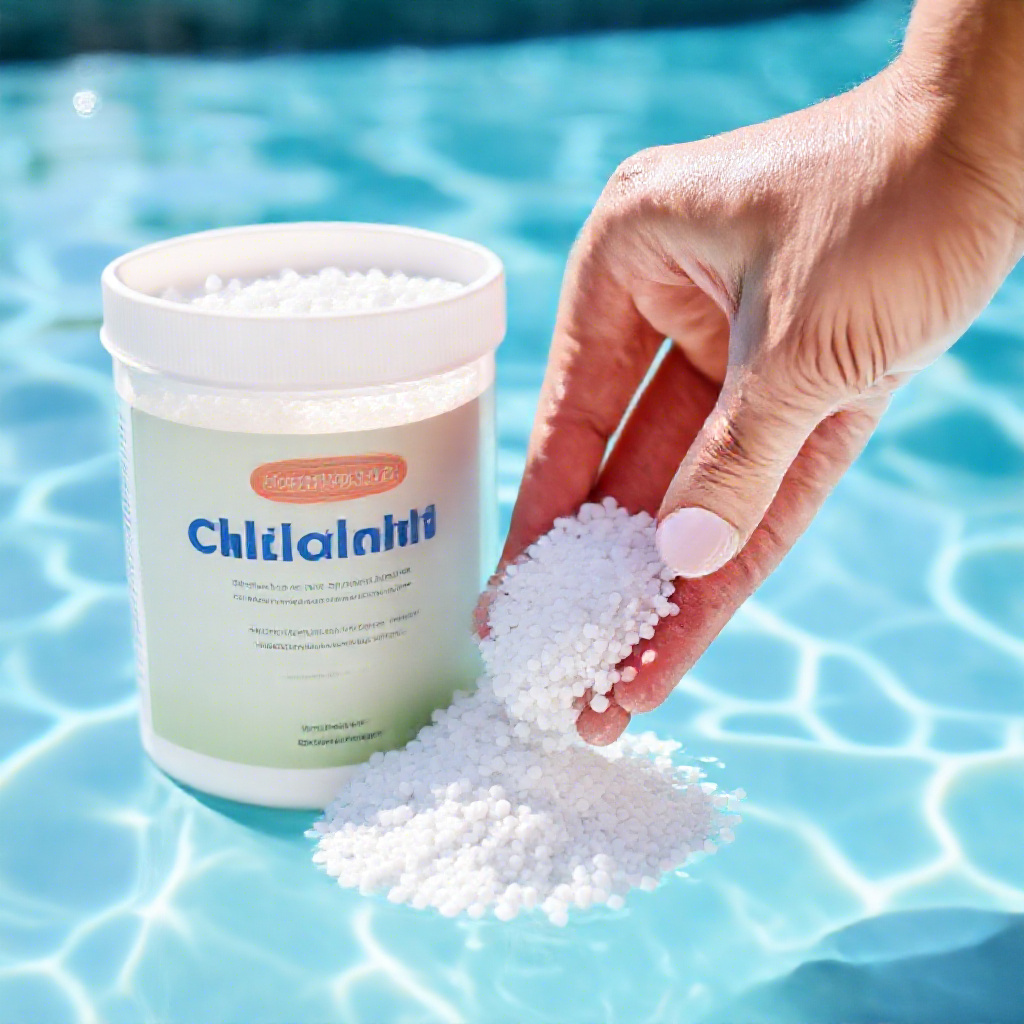Chlorine granules are trusted for maintaining the cleanliness and safety of pool and hot tub water. This guide examines the types of chlorine granules, their applications, times and places of use, and where to purchase them for optimal outcomes in water care practices.
What Are Chlorine Granules Used For?
Chlorine granules serve mainly for sanitizing pool and hot tub water against bacteria, algae and other contaminants. The granules quickly increase chlorine levels which makes them suitable for routine maintenance and shock treatments. Chlorine granules dissolve quickly and assist in the creation of a balanced and safe aquatic environment.
What Are Stabilized Chlorine Granules?
Stabilized chlorine granules include cyanuric acid as a stabilizer which safeguards chlorine from UV light breakdown. Outdoor pool users will find the most benefit from this granule form because it provides long-lasting chlorine effectiveness during sunlight exposure.
What Is Chlorine Granules?
Chlorine granules are the concentrated form of chlorine designed for the sanitation of pools and hot tubs. Granules can come in two main forms:
Calcium Hypochlorite is a strong chlorine granule containing 65% available chlorine for pool shock treatments and sanitizing purposes.
Sodium Dichloroisocyanurate (Dichlor): The granules are stabilized by cyanuric acid making them ideal for outdoor pool use due to their extended longevity.
Chlorine granules dissolve quickly so they are suitable for both everyday chlorine level adjustments and powerful shock treatments.
What Is Stabilized Chlorine Granules?
Stabilized chlorine granules consist of chlorine granules with a stabilizer element that typically includes cyanuric acid. The stabilizer extends the life of chlorine by shielding it from sunlight exposure. The stabilized product works to keep chlorine at a constant level throughout time especially in sunny conditions where unprotected chlorine degrades rapidly.
When to Use Chlorine Granules?
Chlorine granules serve several uses to preserve clear water while maintaining safety standards. Here’s when to use them:
Regular Maintenance: Use chlorine granules daily or weekly to keep chlorine levels steady, particularly after heavy pool or hot tub use.
Shock Treatment: Shock treatments are necessary when chlorine levels are low, after heavy use, or when the water becomes cloudy or visibly contaminated. Granules are ideal for quick, high-concentration chlorine boosts.
After Rainfall: Heavy rainfall causes contaminants to enter the water while lowering chlorine concentrations so granules should be added to rebalance pool or hot tub water.
Where Do You Put Chlorine Granules?
To get the best results and to stay safe, dissolve the chlorine granules in water first before adding them to your pool or hot tub. The dissolution method helps to distribute the granules evenly throughout the water to prevent them from accumulating on surfaces which might lead to discoloration or structural damage. The dissolved solution should be poured into the hot tub or around the edges of the pool while the pump operates to achieve proper mixing.
Where to Buy Chlorine Granules
Chlorine granules are easily accessible at pool supply stores as well as DIY retailers and online retailers. Some popular places to purchase chlorine granules include:
Pool Supply Stores: These stores provide an extensive selection of chlorine products along with professional pool care guidance from experts.
Home Improvement Stores: B&Q and other major chains sell chlorine granules in particular during swimming season.
Online Retailers: Online marketplaces along with The Pool Cleaners and other specialist pool websites provide delivery services for chlorine granules.
Frequently Asked Questions (FAQ)
Stabilized Chlorine Granules perform better than non-stabilized granules in outdoor pools.
Outdoor pools benefit most from stabilized granules because they protect against UV degradation which prolongs their effectiveness. Non-stabilized granules work well for indoor pools where UV protection needs are lower.
Can I Use Chlorine Granules in a Floating Dispenser?
Floating dispensers serve the purpose of releasing slow-dissolving chlorine tablets instead of granules. Granules dissolve too fast so they require pre-dissolving in water before pool or hot tub use.
At what frequency should I add Chlorine Granules to the solution?
The process of maintaining a free chlorine level of 1-3 ppm requires daily testing of pools followed by granule addition. Hot tub users should check chlorine levels before use to achieve 3-5 ppm.
Stabilized chlorine contains cyanuric acid which protects against UV decay thus making it suitable for outdoor pools. Non-stabilized chlorine does not receive UV protection so it works better with indoor pool environments.
Conclusion
The maintenance of pool and hot tub water relies on chlorine granules for both cleanliness and safety purposes. The knowledge of stabilized and non-stabilized granule characteristics and applications helps you select proper water care options. The use of chlorine granules along with regular testing provides a dependable method to maintain sparkling and safe water.
